
83.3K
Downloads
556
Episodes
Welcome to the PTSD and Beyond Podcast with Dr. Deb Lindh, where we give you insights into PTSD, trauma, healing, recovery, and beyond!
In each episode, we have a conversation with an inspiring guest who will stimulate your mind, touch your heart, connect with your spirit, and give you a greater understanding of yourself and others on this healing and recovery journey.
Hopefully, we’ll also provide insights into possibilities, meaning, purpose, and hope. Thanks for listening and enjoy the podcast!
Welcome to the PTSD and Beyond Podcast with Dr. Deb Lindh, where we give you insights into PTSD, trauma, healing, recovery, and beyond!
In each episode, we have a conversation with an inspiring guest who will stimulate your mind, touch your heart, connect with your spirit, and give you a greater understanding of yourself and others on this healing and recovery journey.
Hopefully, we’ll also provide insights into possibilities, meaning, purpose, and hope. Thanks for listening and enjoy the podcast!
Episodes
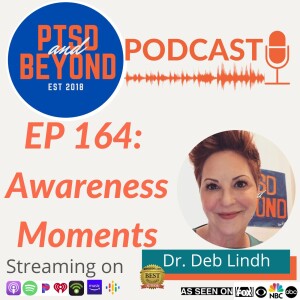
Friday Nov 11, 2022
EP 164: Awareness Moments
Friday Nov 11, 2022
Friday Nov 11, 2022
Support PTSD and Beyond - Buy us a Ko-fi cuppa or support our crowdfunding on GoFundMe!
PTSD and Beyond Patreon Sponsor- Dr. Pamela Hall! Thank YOU!
Sponsor Dr. Pamela Hall, visit:
Book: PTSDUnplugged
We do the work. We find ourselves looking, searching, wanting answers and clarity. I had some breakthrough awareness moments and in this episode I share what lead up to the awareness moment, the importance of a day of pause, and steps to practice.
As always...listen, take what resonates, and go beyond!
In Love and Healing,
Dr. Deb
To connect with Dr. Deb Lindh, visit:
Website - Dr. Deb Lindh
Twitter - @DebraLindh
Twitter- @PTSDandBeyond
LinkedIn - Dr. Deb Lindh
More on PTSD and Beyond:
For further information about the PTSD and Beyond Podcast, global #PTSDandBeyond Twitter Chat (every MON @ 8 p.m. ET), and PTSDandBeyond.org, connect at: Hello@PTSDandBeyond.org
Support PTSD and Beyond - Buy us a Ko-fi cuppa our crowdfunding on GoFundMe!
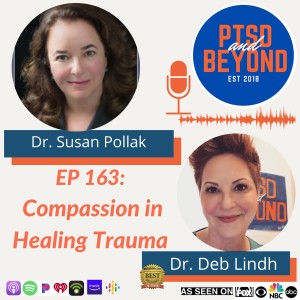
Friday Oct 28, 2022
EP 163: Compassion in Healing Trauma with Dr. Susan Pollak
Friday Oct 28, 2022
Friday Oct 28, 2022
Support PTSD and Beyond - Buy us a Ko-fi cuppa or support our crowdfunding on GoFundMe!
PTSD and Beyond Patreon Sponsor- Dr. Pamela Hall! Thank YOU!
Sponsor Dr. Pamela Hall, visit:
Book: PTSDUnplugged
Self-compassion training alters neural responses to pain, Dr. Susan Pollak
Today's PTSD and Beyond Podcast guest is author and co-founder and teacher at the Center for Mindfulness and Compassion at Harvard Medical School / Cambridge Health Alliance, Dr. Susan Pollak. A longtime student of meditation and yoga, Dr. Pollak began integrating the practices of meditation into psychotherapy since the 1980s. The author of the Psychology Today blog, The Art of Now: Essential Skills for Mindfulness, Dr. Pollak shares practices and insights of bringing mindfulness into day life!
In this episode we cover:
~ Essentials of self-compassion
~ New insights from integrating meditation into psychotherapy
~ Inspiration from daily life stories
~ AND MORE
As always...listen, take what resonates, and go beyond!
In Love and Healing,
Dr. Deb
To connect with Dr. Susan Pollak, visit:
Website -DrSusanPollak.com
Books - Sitting Together
To connect with Dr. Deb Lindh, visit:
Website - Dr. Deb Lindh
Twitter - @DebraLindh
Twitter- @PTSDandBeyond
LinkedIn - Dr. Deb Lindh
More on PTSD and Beyond:
For further information about the PTSD and Beyond Podcast, global #PTSDandBeyond Twitter Chat (every MON @ 8 p.m. ET), and PTSDandBeyond.org, connect at: Hello@PTSDandBeyond.org
Support PTSD and Beyond - Buy us a Ko-fi cuppa our crowdfunding on GoFundMe!
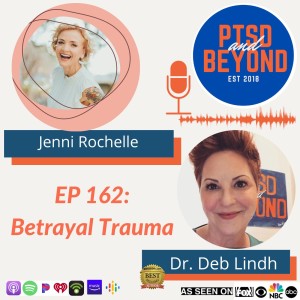
Thursday Oct 20, 2022
EP 162: Betrayal Trauma with Jenni Rochelle
Thursday Oct 20, 2022
Thursday Oct 20, 2022
Support PTSD and Beyond - Buy us a Ko-fi cuppa or support our crowdfunding on GoFundMe!
PTSD and Beyond Patreon Sponsor- Dr. Pamela Hall! Thank YOU!
Sponsor Dr. Pamela Hall, visit:
Book: PTSDUnplugged
"I deserve to have better," Jenni Rochelle
Trauma caused by betrayal in a relationship left Founder of Beauty After Betrayal™ realizing that she deserved better. Helping women to become the love of their lives, Jenni uses her healing wisdom and insights from lived-experiences and as a certified life coach trained in the Multi-Dimensional Partner Trauma Model (MPTM).
"I learned the power of waking up every morning and choosing to be committed to me," Jenni Rochelle
In this episode we cover:
~ Jenni's story
~ The awakening moment that led to change
~ The different applications of essential oils
~ Healthy relationships, trust, and love after betrayal (yes, it's true!)
~ AND MORE
As always...listen, take what resonates, and go beyond!
In Love and Healing,
Dr. Deb
To connect with Jenni Rochelle, visit:
Website -JenniRochelle.com
Facebook - Jenni Rochelle Coaching
To connect with Dr. Deb Lindh, visit:
Website - Dr. Deb Lindh
Twitter - @DebraLindh
Twitter- @PTSDandBeyond
LinkedIn - Dr. Deb Lindh
More on PTSD and Beyond:
For further information about the PTSD and Beyond Podcast, global #PTSDandBeyond Twitter Chat (every MON @ 8 p.m. ET), and PTSDandBeyond.org, connect at: Hello@PTSDandBeyond.org
Support PTSD and Beyond - Buy us a Ko-fi cuppa our crowdfunding on GoFundMe!
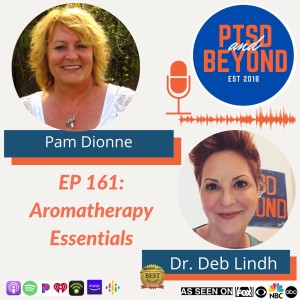
Friday Oct 14, 2022
EP 161: Aromatherapy Essentials with Pam Dionne
Friday Oct 14, 2022
Friday Oct 14, 2022
Support PTSD and Beyond - Buy us a Ko-fi cuppa or support our crowdfunding on GoFundMe!
PTSD and Beyond Patreon Sponsor- Dr. Pamela Hall! Thank YOU!
Sponsor Dr. Pamela Hall, visit:
Book: PTSDUnplugged
Aromatherapy is the application of scents and oils either such as aromas, topically, and diffuse. It's part of integrative wellness and ancient practices. Aromatherapy spans across many cultures around the globe. It's an ancient practice found from India, China, Greece, Peru, Mexico, Native America.
In today's PTSD and Beyond Podcast, I welcome guest is Pam Dionne of Wyndmere Naturals and also her own Etsy Store, Essentially Minnesota.
In this episode we cover:
~ The difference between therapeutic grade vs. fragrance/cosmetic oils
~ Scents can be reactive for someone with PTSD
~ The different applications of essential oils
~ Specific blends support mental health and trauma recovery
~ AND MORE
As always...listen, take what resonates, and go beyond!
In Love and Healing,
Dr. Deb
To connect with Pam Dionne and Wyndmere Essentials, visit:
Website - WyndmereNaturals (Code: Gratitude20)
Etsy - EssentiallyMN
To connect with Dr. Deb Lindh, visit:
Website - Dr. Deb Lindh
Twitter - @DebraLindh
Twitter- @PTSDandBeyond
LinkedIn - Dr. Deb Lindh
More on PTSD and Beyond:
For further information about the PTSD and Beyond Podcast, global #PTSDandBeyond Twitter Chat (every MON @ 8 p.m. ET), and PTSDandBeyond.org, connect at: Hello@PTSDandBeyond.org
Support PTSD and Beyond - Buy us a Ko-fi cuppa our crowdfunding on GoFundMe!
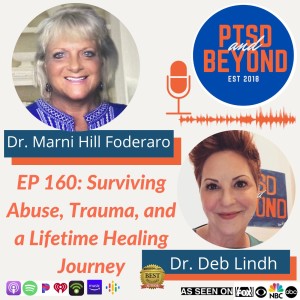
Friday Oct 07, 2022
EP 160: Dr. Marni Hill Foderaro
Friday Oct 07, 2022
Friday Oct 07, 2022
Support PTSD and Beyond - Buy us a Ko-fi cuppa or support our crowdfunding on GoFundMe!
PTSD and Beyond Patreon Sponsor- Dr. Pamela Hall! Thank YOU!
Sponsor Dr. Pamela Hall, visit:
Book: PTSDUnplugged
Have you experienced a series of coincidences that led you to believe there are no coincidences and those experiences are really synchronicities guiding us on our path?
In this episode of PTSD and Beyond, I’m joined by the inspirational award-winning author, educator, and speaker Dr. Marni Hill Foderaro. A survivor of a toxic and abusive marriage, Dr. Marni shares her story and her life journey that led her to become a world recognized storyteller and advocate she is today.
Endorsed by best-selling author of “the Celestine Prophecy,” James Redfield, Dr. Marni is passionate about honesty, integrity, equality, and handling life's challenges with compassion, honesty and love.
As always...listen, take what resonates, and go beyond!
In Love and Healing,
Dr. Deb
To connect with Dr. Marni Hill Foderaro, visit:
Website - Dr. Marni Hill Foderaro
Books - God Came to My Garage Sale
To connect with Dr. Deb Lindh, visit:
Website - Dr. Deb Lindh
Twitter - @DebraLindh
Twitter- @PTSDandBeyond
LinkedIn - Dr. Deb Lindh
More on PTSD and Beyond:
For further information about the PTSD and Beyond Podcast, global #PTSDandBeyond Twitter Chat (every MON @ 8 p.m. ET), and PTSDandBeyond.org, connect at: Hello@PTSDandBeyond.org
Support PTSD and Beyond - Buy us a Ko-fi cuppa our crowdfunding on GoFundMe!

Friday Oct 07, 2022
EP: 159 Green Flags
Friday Oct 07, 2022
Friday Oct 07, 2022
Support PTSD and Beyond - Buy us a Ko-fi cuppa or support on Patreon!
PTSD and Beyond Patreon Sponsors - Dr. Pamela Hall and T. Wilton Dale! Thank YOU!
Sponsor Dr. Pamela Hall, visit:
Book: PTSDUnplugged
Sponsor T. Wilton Dale, visit:
"Green Flags can bring about anxiety for abuse survivors because our normal was dysfunctional-normal and green flags are healthy-normal which is something we need to get used to, " Deb Lindh, EdD
What are green flags?
How are green flags different than red flags?
Can a narcissist use green flags to coerce and then flip to red flags?
In today's PTSD and Beyond Podcast episode, I cover these questions, share examples of green flags, a "miracle moment," and much more!
As always...listen, take what resonates, and go beyond!
In Love and Healing,
Dr. Deb
To connect with Dr. Deb Lindh, visit:
Website - Dr. Deb Lindh
Twitter - @DebraLindh
Twitter- @PTSDandBeyond
LinkedIn - Dr. Deb Lindh
More on PTSD and Beyond:
For further information about the PTSD and Beyond Podcast, global #PTSDandBeyond Twitter Chat (every MON @ 8 p.m. ET), and PTSDandBeyond.org, connect at: Hello@PTSDandBeyond.org
Support PTSD and Beyond - Buy us a Ko-fi cuppa or support on Patreon!
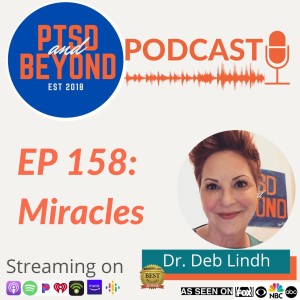
Friday Sep 16, 2022
EP 158: Miracles
Friday Sep 16, 2022
Friday Sep 16, 2022
Support PTSD and Beyond - Buy us a Ko-fi cuppa or support on Patreon!
PTSD and Beyond Patreon Sponsors - Dr. Pamela Hall and T. Wilton Dale! Thank YOU!
Sponsor Dr. Pamela Hall, visit:
Book: PTSDUnplugged
Sponsor T. Wilton Dale, visit:
"A true miracle is often defined as an event that defies the laws of nature," Bernie Siegel, M.D.
Have you ever experienced a miracle? What about experiencing something that you experienced but dismissed as a fluke or coincidence?
In Dr. Bernie Siegel's book, A Book of Miracles: Inspiring True Stories of Healing, Gratitude, and Love, these stories are inspiring proof that miracles do indeed exist. Each story is a personal lived-experience of magic and awe that is all around us every day.
Before recording this episode, I experienced a thought...a vision of something that could happened. And then it did! A miracle for sure.
As always...listen, take what resonates, and go beyond!
In Love and Healing,
Dr. Deb
To connect with Bernie, visit:
Website - BernieSiegelMD
Books - Love, Medicine, & Miracles, 101 Exercises for the Soul, When You Realize How Perfect Everything Is (Bernie Siegel, MD & Grandson, Charlie Siegel), A Book of Miracles
Poetry - by Bernie
To connect with Dr. Deb Lindh, visit:
Website - Dr. Deb Lindh
Twitter - @DebraLindh
Twitter- @PTSDandBeyond
LinkedIn - Dr. Deb Lindh
More on PTSD and Beyond:
For further information about the PTSD and Beyond Podcast, global #PTSDandBeyond Twitter Chat (every MON @ 8 p.m. ET), and PTSDandBeyond.org, connect at: Hello@PTSDandBeyond.org
Support PTSD and Beyond - Buy us a Ko-fi cuppa or support on Patreon!
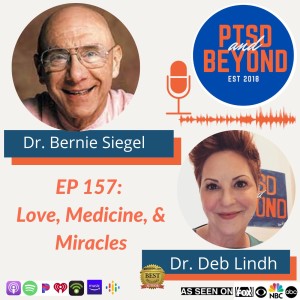
Thursday Sep 08, 2022
EP 157: Love, Medicine, & Miracles with Dr. Bernie Siegel, M.D.
Thursday Sep 08, 2022
Thursday Sep 08, 2022
Support PTSD and Beyond - Buy us a Ko-fi cuppa or support on Patreon!
PTSD and Beyond Patreon Sponsors - Dr. Pamela Hall and T. Wilton Dale! Thank YOU!
Sponsor Dr. Pamela Hall, visit:
Book: PTSDUnplugged
Sponsor T. Wilton Dale, visit:
"Life is one great experiment, and it can be joyful," Bernie Siegel, M.D.
On June 12, 1989, Dr. Bernie Siegel graced the cover of the New Yorker. Entitled, "Doctor Love...Bernie Siegel and his controversial theories of self-healing."
Einstein said, "Great spirits have always encountered violent opposition from mediocre minds." Dr. Siegel (who refers to be called Bernie) is a pioneer in the Mind-Body Healing relationship and revolutionized the way doctors and patients harnessed the power of the mind to heal. A retired general and pediatric surgeon, New York Times Best-Selling Author, founder of the ECap (a form of individual and group therapy for cancer patients), Bernie challenged conventional medical practices when experiencing patients who defied the odds of healing, getting well, and living fulfilling lives.
One patient said to Bernie, "You're a nice guy...I feel better seeing you but I cannot take you home." This experience got Bernie thinking that he could do more as doctor to help people between office visits.
In this episode, Bernie shares the inspiration he's given to tens of millions of people over the years spanning over 4 decades. He talks about an experience interpreting a drawing with Elisabeth Kubler-Ross, the importance of love, how doctor and patient work together as a team, the one question to ask yourself when struggling.
As always...listen, take what resonates, and go beyond!
In Love and Healing,
Dr. Deb
To connect with Bernie, visit:
Website - BernieSiegelMD
Books - Love, Medicine, & Miracles, 101 Exercises for the Soul, When You Realize How Perfect Everything Is (Bernie Siegel, MD & Grandson, Charlie Siegel)
Poetry - by Bernie
To connect with Dr. Deb Lindh, visit:
Website - Dr. Deb Lindh
Twitter - @DebraLindh
Twitter- @PTSDandBeyond
LinkedIn - Dr. Deb Lindh
More on PTSD and Beyond:
For further information about the PTSD and Beyond Podcast, global #PTSDandBeyond Twitter Chat (every MON @ 8 p.m. ET), and PTSDandBeyond.org, connect at: Hello@PTSDandBeyond.org
Support PTSD and Beyond - Buy us a Ko-fi cuppa or support on Patreon!
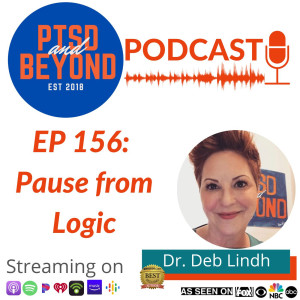
Thursday Sep 01, 2022
EP 156: Pause on Logic
Thursday Sep 01, 2022
Thursday Sep 01, 2022
Support PTSD and Beyond - Buy us a Ko-fi cuppa or support on Patreon!
PTSD and Beyond Patreon Sponsors - Dr. Pamela Hall and T. Wilton Dale! Thank YOU!
Sponsor Dr. Pamela Hall, visit:
Book: PTSDUnplugged
Sponsor T. Wilton Dale, visit:
Taking a pause from logic, what remains? Logic drives us approach life like it's a transaction...we get from A to B, we do C and D. What do we miss out on? In a world afraid of emotions and feelings, this week's PTSD and Beyond Podcast, Dr. Deb covers a guided exercise to pause on the logic and embrace feelings and emotions.
Give a listen. Take what resonates and Go Beyond!
xoxo,
Dr. Deb
To connect with Dr. Deb Lindh, visit:
Website - Dr. Deb Lindh
Twitter - @DebraLindh
Twitter- @PTSDandBeyond
LinkedIn - Dr. Deb Lindh
More on PTSD and Beyond:
For further information about the PTSD and Beyond Podcast, global #PTSDandBeyond Twitter Chat (every MON @ 8 p.m. ET), and PTSDandBeyond.org, connect at: Hello@PTSDandBeyond.org
Support PTSD and Beyond - Buy us a Ko-fi cuppa or support on Patreon!
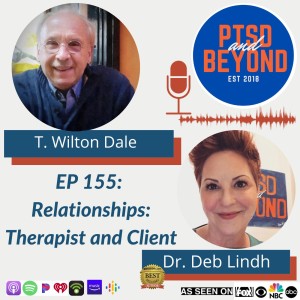
Thursday Aug 18, 2022
EP154: Relationships: Therapist and Client with T. Wilton Dale
Thursday Aug 18, 2022
Thursday Aug 18, 2022
Support PTSD and Beyond - Buy us a Ko-fi cuppa or support on Patreon!
PTSD and Beyond Patreon Sponsors - Dr. Pamela Hall and T. Wilton Dale! Thank YOU!
Sponsor Dr. Pamela Hall, visit:
Book: PTSDUnplugged
Sponsor T. Wilton Dale, visit:
TRIGGER WARNING: SUICIDE IDEOLOGY
This week's PTSD and Beyond Podcast, we welcome back retired psychologist and author, T. Wilton Dale! In a previous episode, we discussed things around when choosing a therapist. This week's PTSD and Beyond Podcast Episode, we look at the relationship between therapist and client.
In our conversation we cover:
~ Questions people can ask their therapist
~ Questions therapists can ask their clients
~ Stories to reiterate relationship examples
~ What enhances the person-to-person relationship
~ Boundaries and professionalism
and MORE!
Give a listen. Take what resonates and Go Beyond!
xoxo,
Dr. Deb
To connect with T. Wilton Dale, visit:
To connect with Dr. Deb Lindh, visit:
Website - Dr. Deb Lindh
Twitter - @DebraLindh
Twitter- @PTSDandBeyond
LinkedIn - Dr. Deb Lindh
More on PTSD and Beyond:
For further information about the PTSD and Beyond Podcast, global #PTSDandBeyond Twitter Chat (every MON @ 8 p.m. ET), and PTSDandBeyond.org, connect at: Hello@PTSDandBeyond.org
Support PTSD and Beyond - Buy us a Ko-fi cuppa or support on Patreon!
